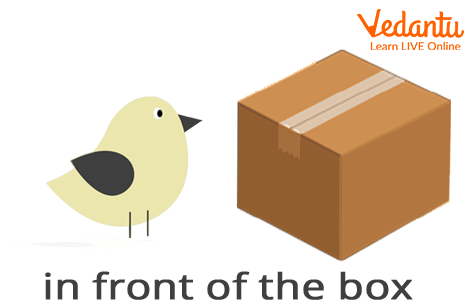




Clear Examples of “In Front Of” in English Sentences
Prepositions are those words or phrases that are used to show time, direction, place, etc. These words are generally used before a noun or pronoun. Prepositions are very useful to understand the structure of a sentence. Proper usage of prepositions helps students to understand what a narrator or author wants to say.
You can easily understand the preposition with these basic examples:
1. The cat is on the table.
2. The cat is under the table.
3. The cat is in front of me.
There are many prepositions. In this article, we will discuss the preposition ‘in front of’.
How to Use Prepositions in Front of?
Prepositions of place are excellent terms to begin learning, particularly for children with a limited English vocabulary. These prepositions describe the position of something: in front of, behind, or between. While your children may be able to express the name of their favourite item, they can indicate where it is by using preposition words. "My teddy bear is behind the bed," for example, or "My automobile is in front of the table." While learning preposition words might be difficult, it's always enjoyable to practise them with children.
A noun phrase is commonly used with a function word to generate a phrase that communicates a change or prediction. A preposition is a tiny, frequent word that indicates direction (to in "a letter to you"), place (at in "at the door"), or time (by in "by noon"), or that introduces an item (of in "a basket of apples"). The object of a preposition is usually a noun (noon), a noun phrase (the door), or a pronoun (you).
A preposition is a word that connects a noun or pronoun to the remainder of the phrase, according to English grammar. The words "in," "beside," "through," and "into" are examples of prepositions. Your children will want to be able to express themselves more completely as they get more comfortable utilising English words and phrases that they already know. Prepositions come into play here!
Examples of Preposition in Front of
They've come to a halt in front of their house.
This Cow statue is in front of a temple.
The car is in front of the building.
Last night, they sat in front of the TV and watched a movie.
He's in front of his computer.
Right in front of us, a dolphin leapt from the ocean.
On occasion, it's impolite to chuckle in front of others, especially while they're attempting to concentrate on something important.
He tries not to smoke in front of his children since he doesn't want them to be exposed to secondhand smoke.
This cat is walking in front of its owner.
The teacher is standing in front of the class.
Almasri is standing in front of the Eiffel Tower.

The Bird in Front of the Box
Preposition Song
Prepositions give you time, place, position
Come on along sing The Preposition Song
Prepositions give you time, place, position
Come on along sing The Preposition Song.
In front of, behind, between,
In front of, behind, between,
In front of, behind, between,
In front of, behind, between.
Prepositions give you time, place, position
Come on along sing The Preposition Song
Prepositions give you time, place, position
Come on along sing The Preposition Song.

Kids are in Front of the School
The Most Frequently Used Prepositions
Some of the most frequently used prepositions are at, for, from, in, of, on, to, with, about, above, across, after, against, along, among, around, because of, before, behind, below, beneath, beside, between, close to, down, during, except, inside, instead of, into, like, near, off, on top of, onto, out of, outside, over, past, since, through, toward, under, until, up, upon, within, without.
Conclusion
English can become more enjoyable when kids learn prepositions. The children will be able to begin describing the world around them and recognising how English is used in their daily lives. Play a prepositional phrase game at home to improve your skills. Tell the kid to stand behind the sofa or in front of the refrigerator. This will keep students engaged and make grammar more interesting for them.
FAQs on In Front Of: How to Use This Preposition Correctly
1. What type of preposition do we have in front of us?
"In front of" and "against" are both prepositions of place that indicate the location of something.
2. What are the preposition examples?
A preposition is a word or set of words that come before a noun, pronoun, or noun phrase to indicate a direction, time, place, location, spatial connections, or to introduce an object. Words like "in," "at," "on," "of," and "to" are examples of prepositions.
3. What is the best way to utilise the preposition in front of?
'Close to the front of something or someone' is the meaning of the prepositional term in front of. It's the reverse of behind: I couldn't see the screen since there was a really tall man in front of me. Alternatively, I was seated in front of a really tall man and couldn't see the screen clearly.















